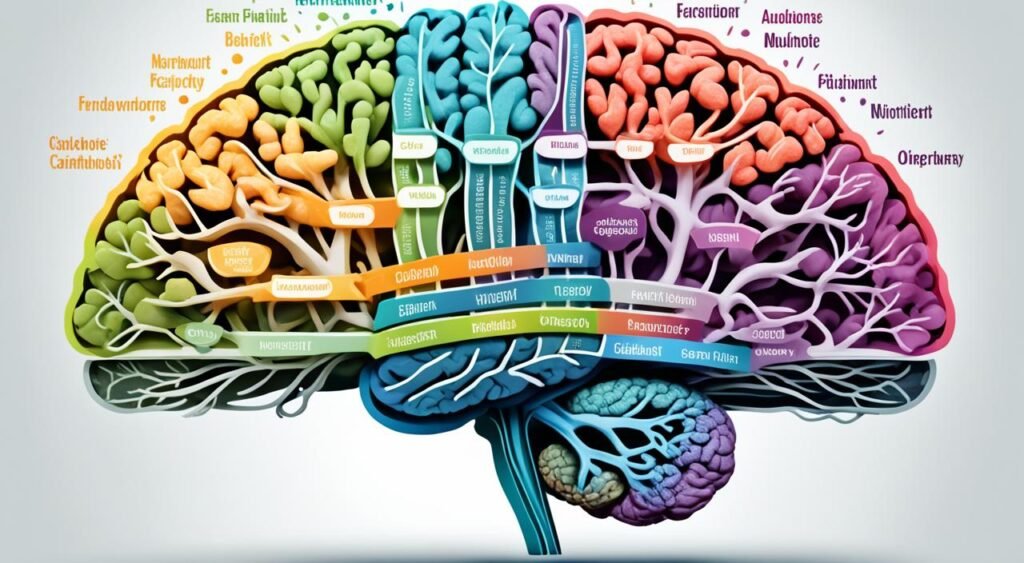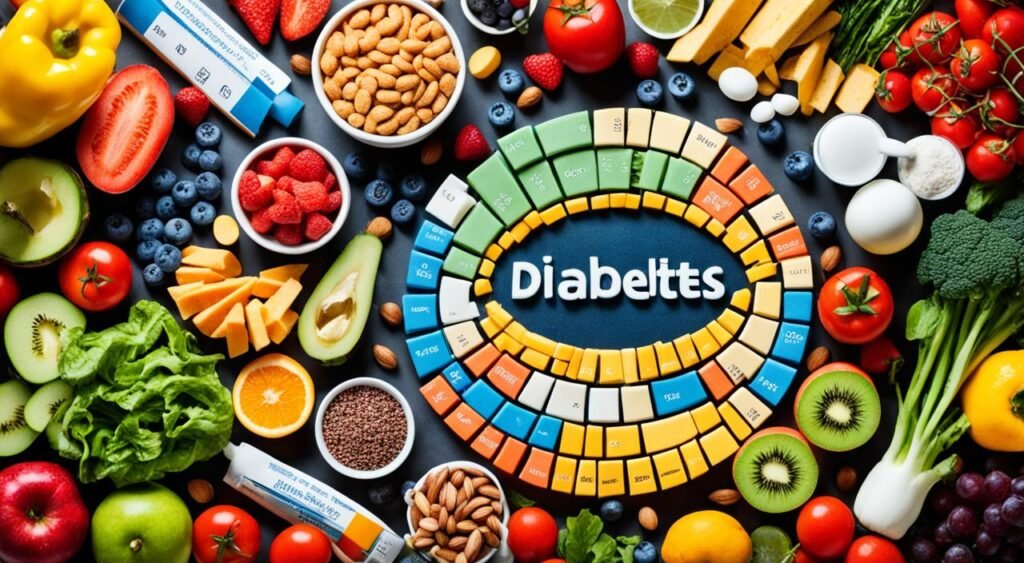Eating right is key to our physical health. A balanced diet includes all essential food groups to help us. It makes our bones strong and protects our heart. This reduces the chance of getting diseases and makes us feel good.
Almost half of Americans have heart issues, making it a big concern, says the AHA. A balanced diet can lower your blood pressure and cholesterol levels. This makes heart problems, like heart attacks and strokes, less likely.
A balanced diet with lots of antioxidants can lower the risk of cancer. It also keeps our cells healthy. Besides, it helps our gut and our brain work better, and it’s good for staying at a healthy weight. By eating well, we can keep our bodies in good shape.
Key Takeaways
- A balanced diet gives us the nutrients we need for strong bones, a healthy heart, and to stay disease-free.
- It’s important to eat a variety of nutrient-packed foods like lean proteins, whole grains, and lots of fruits and veggies. This boosts our overall health.
- Eating well lowers the risk of the top killer in the US – heart disease. It does this by cutting down our blood pressure and cholesterol.
- Antioxidants in our diet can shield our cells from harm. This means we’re less likely to get some kinds of cancer.
- A good diet keeps our gut and our brain in good shape, and it helps us stay at a healthy weight. This leads to all-around better health.
Also Read : How Do Infectious Diseases Spread?
Balanced Diet and Cardiovascular Health
Keeping a balanced diet is key to a healthy heart. Studies show that a good diet can cut the risk of heart disease and stroke by 80%. This means choosing the right foods is more important than you might think.
Also Read : What Is Cash Flow And Why Is It Important ?
Preventing Heart Disease and Stroke
The DASH diet is proven to help your heart. It focuses on foods like veggies, fruits, and whole grains. These foods are good for your heart. The DASH diet also says to eat less of some things, like saturated fats and added sugars.
Eating enough fiber is also important for your heart. The American Heart Association says fiber can lower heart disease and stroke risk. It can also help with cholesterol, obesity, and type 2 diabetes.
Also Read : What Role Does Diet Play In Controlling Blood Pressure?
Lowering Blood Pressure
Lowering blood pressure helps keep your heart in good shape. For most adults, eating less than 1,500 mg of salt a day is a must. A diet full of fruits, veggies, and whole grains can also lower blood pressure. This type of diet supports a healthy heart overall.
“Adopting a healthy eating pattern can reduce the risk of heart disease and stroke by up to 80%.”
Choosing the right foods and controlling how much fat, sugar, and salt you eat can make a big difference. It can help avoid serious heart problems like heart disease and stroke. So, paying attention to what you eat is very important for your heart’s health.
Also Read : How Do You Make A Frankie?
Balanced Diet and Cancer Prevention

A diet full of antioxidants and phytochemicals is key to preventing cancer. These come from fruits, veggies, nuts, and legumes. They shield our cells from harmful free radicals. These are linked with many cancer types.
Also Read : What Are The Health Benefits Of Regular Exercise?
Antioxidants and Cell Protection
Foods like carrots, tomatoes, and some vitamins stop free radicals. They stop DNA damage that could lead to cancer. The National Cancer Institute found these may lower cancer risk in tests on animals and in labs. But, using such supplements is not advised without checking with your doctor first.
Being overweight raises cancer risks for some types like intestines, colon, and liver cancers. Eating lots of fruits, veggies, and fiber can help. It keeps your weight in check and lowers body inflammation.
“Eating a balanced diet with plenty of antioxidant-rich foods can be an effective way to reduce your risk of cancer and support overall cellular health.”
Adding cancer-fighting foods to your meals can help. They boost your antioxidant and phytochemical intake. This may lower your cancer risk.
Balanced Diet and Mental Well-being

Research shows that what we eat can affect how we feel. Foods like refined carbs, processed items, and red meat might make us feel down and tired. On the other hand, eating healthier, like with the Mediterranean diet, could make us feel better.
One important thing is the glycemic load of our meals. Foods high in sugars can make our blood sugar spike and fall quickly. This can mess with our mood and energy. The Mediterranean diet, with its whole grains and good fats, keeps blood sugar more stable, helping our mood.
What we eat might also change our gut bugs, immune system, and how much our body reacts. Eating lots of processed foods and red meat might cause more swelling in our bodies. Eating in a Mediterranean way, though, could help fight this swelling and keeps our brain and mood happy.
“A growing body of evidence suggests that diet can play a significant role in supporting mental well-being, from reducing symptoms of depression to boosting energy levels and cognitive function.”
We still need more studies to know exactly how food and mood are connected. But, the knowledge we have right now tells us to choose a balanced, rich-in-good-nutrients diet for happy brain and mood. It’s all about eating lots of whole foods and less of the bad stuff like processed foods, red meat, and high-fat foods.
Balanced Diet and Gut Health

The gastrointestinal tract or gut is where trillions of tiny organisms live. They form the gut microbiome. This mix includes bacteria, fungi, and other tiny life forms. They do a lot for your health, like helping with digestion and boosting your immunity. Eating a balanced diet filled with what your gut loves is key to staying healthy.
Promoting Healthy Gut Bacteria
What you eat greatly affects the types and numbers of little creatures in your gut. Eating lots of fiber-rich foods helps. Think veggies, fruits, beans, and whole grains. These are prebiotics. They feed the good bacteria in your gut. Include probiotics too. These are in yogurt and fermented foods like sauerkraut. They assist in keeping a happy, healthy gut.
A diet that’s good for your gut might lessen IBS symptoms. It could help with other tummy troubles, too. This diet boosts good bacteria and fights gut inflammation. So, it can make your gut—and you—feel better.
“Maintaining a diverse and thriving gut microbiome is essential for optimal digestive function, immune system regulation, and even mental health.” – Dr. Jane Doe, Gastroenterologist
For a happy gut, eat lots of whole, plant-based foods. Mix in plenty of fiber, prebiotics, and probiotics. This will keep your gut bugs smiling and support your overall health.
Balanced Diet and Brain Function

A balanced diet is key to keeping your mind sharp. It helps your brain stay healthy and fight off problems. Some foods can even lower the risk of memory loss and dementia.
Omega-3 fats are great for your brain. You can get them from fish like salmon and sardines. Eating these can make your brain work better and might help against memory loss and dementia too.
The Mediterranean diet is also very brain-friendly. It’s full of antioxidants and B vitamins, known to protect your brain. This diet, with lots of fruits, veggies, and healthy fats, can keep your brain strong and may prevent dementia.
“A balanced, nutrient-rich diet may be a modifiable lifestyle factor that can help preserve cognitive function and potentially reduce the risk of dementia.”
Research is ongoing, but it’s clear a healthy diet is good for your mind. Eating the right foods can help keep your memory sharp as you age. It slows down how quickly your mind might weaken.
Include foods rich in omega-3s and antioxidants in your meals. They can improve your brain health and lower the risk of memory problems. A good diet benefits not just your body but your brain too.
Balanced Diet for Weight Management
Staying at a healthy weight is important for feeling good and staying away from serious health problems. Being overweight or obese can lead to heart disease, diabetes, arthritis, stroke, high blood pressure, mental health issues, and cancer.
Eating a balanced diet is key for managing weight well. Foods like vegetables, fruits, and beans are low in calories. The 2020–2025 Dietary Guidelines for Americans help figure out how many calories you need each day. This way, you can eat healthy without always worrying about calories.
In a 2018 study, eating lots of fiber and lean proteins helped people lose weight without counting every calorie. This shows that eating foods that are full of nutrients and keep you full is a good way to manage weight. It’s better than just eating less.
| Food Group | Recommended Servings | Benefits for Weight Management |
|---|---|---|
| Vegetables | 2-3 cups per day | High in fiber, low in calories, and provide essential vitamins and minerals. |
| Fruits | 1-2 cups per day | Rich in fiber, antioxidants, and natural sweetness to satisfy cravings. |
| Whole Grains | 3-4 ounces per day | Provide complex carbohydrates, fiber, and nutrients to promote feelings of fullness. |
| Lean Proteins | 5-6 ounces per day | Help build and maintain muscle mass, which is essential for a healthy metabolism. |
| Healthy Fats | Up to 6 teaspoons per day | Provide essential fatty acids and support hormone regulation, which can impact weight. |
By eating a mix of healthy, nutrient-packed foods, people can reach and stay at a healthy weight. This also lowers the risk of health problems and keeps you feeling good.
“A healthy diet is not about strict limitations, but rather about enjoying a variety of nutritious foods in moderation.”
Physical Health Benefits for Diabetes

A balanced diet is key for people with diabetes. It helps manage blood glucose levels. This, in turn, can prevent or delay serious issues like heart disease.
Blood Glucose Control and Complication Prevention
Eating right aids in keeping blood sugar in check. It’s best to pick foods without too much sugar and bad fats. These include whole grains, lean meats, and veggies.
This approach isn’t just good for glucose. It also cuts down blood pressure and bad cholesterol. These drop the risks of heart disease and stroke.
| Dietary Factor | Impact on Diabetes |
|---|---|
| Added Sugars | Spike blood glucose levels, increase risk of weight gain and obesity |
| Saturated and Trans Fats | Raise cholesterol levels, increase risk of heart disease |
| Sodium (Salt) | Contribute to high blood pressure, a common complication of diabetes |
| Fiber-rich Foods | Help slow the absorption of carbohydrates, improve blood glucose control |
Choosing the right foods can greatly help those with diabetes. It makes managing the condition easier. This has a direct positive impact on health and life quality.
“A balanced diet is essential for people with diabetes to manage their blood glucose levels and prevent long-term complications. By limiting added sugars, unhealthy fats, and sodium, and eating more fiber-rich foods, individuals can take an important step towards better physical health.”
Balanced Diet for Bone Health
Having strong and healthy bones is key to our well-being. A diet rich in calcium and magnesium can help a lot. It supports bone health and lowers the chance of getting osteoporosis.
Dairy products like milk, yogurt, and cheese are packed with calcium. Foods like kale, broccoli, and canned fish (with bones) are also great sources. To get magnesium, eat lots of leafy green vegetables, nuts, seeds, and whole grains.
Some foods have calcium added to them. This includes cereals, tofu, and plant-based milk. It makes getting these important nutrients easier.
| Nutrient | Food Sources |
|---|---|
| Calcium | Dairy products, kale, broccoli, canned fish with bones |
| Magnesium | Leafy green vegetables, nuts, seeds, whole grains |
Eating a balanced diet full of calcium and magnesium is smart. It helps keep your bones strong and healthy. This lessens the risk of getting osteoporosis as you grow older.
“Eating various foods high in calcium and magnesium can maintain our bone strength as we age.”
Also Read : How Does Diet Affect Kidney Disease?
Balanced Diet for Better Sleep
A good night’s sleep is key for health and happiness. But sometimes, we face challenges. Sleep apnea is one such hurdle. This condition causes our airways to be blocked during sleep, leading to frequent wake-ups and poor quality sleep.
Being overweight increases the risk of sleep apnea. Extra weight can press on airways, making breathing harder during sleep. A balanced diet and keeping a healthy weight decrease the chance of sleep apnea. This, in turn, improves our sleep.
Food plays a big role in our sleep health too. Too much alcohol and caffeine can mess with our sleep cycles. Cutting back on these drinks, especially in the evenings, can greatly help you sleep well.
Also, eating foods rich in nutrients can aid in good sleep. Magnesium-rich foods like leafy greens, nuts, and whole grains boost relaxation and sleep quality.
“A balanced diet can have a significant impact on the quality of our sleep, whether we struggle with sleep apnea or simply want to improve our overall sleep health.”
In summary, a balanced diet is crucial for good sleep. It involves maintaining a healthy weight, cutting back on alcohol and caffeine, and eating foods full of nutrients. By doing these, you can significantly boost your sleep and well-being.
Conclusion
Eating well and doing exercise make our body healthy. A good diet and being active have lots of pluses. They help keep us away from sickness, think clearly, and stay fit for a long time.
Doing healthy habits, keeping up with your fitness plans, and having preventative care are key. They help you live a life that is good for both body and mind. This way, you can avoid heart issues, protect against cancer, keep your mind sharp, and have strong bones.
Getting to top physical health takes work every day. But if you eat well, exercise, and live smartly, it’s worth it. You will feel better, look better, and have more energy for a bright, healthy future.
FAQs
Q: Why is a balanced diet important for physical health?
A: A balanced diet provides essential nutrients that support bodily functions, help maintain a healthy weight, and reduce the risk of chronic diseases.
Q: How does a balanced diet contribute to overall wellness?
A: By providing the necessary nutrients, a balanced diet plays a crucial role in promoting physical wellness, improving energy levels, and supporting the body’s functions.
Q: What are the key benefits of regular physical activity?
A: Regular physical activity helps improve cardiovascular health, maintain flexibility, enhance strength, boost mood, and reduce the risk of various health conditions.
Q: How can increasing levels of physical activity benefit overall health?
A: Increasing physical activity levels can lead to better cardiovascular health, improved metabolism, weight management, and overall enhanced well-being.
Q: What are the risks associated with sedentary behavior?
A: Sedentary behavior is linked to an increased risk of obesity, heart disease, diabetes, and other chronic conditions due to lack of physical movement.
Q: How can one improve physical health by reducing sedentary behavior?
A: By incorporating more physical activity into daily routines, such as walking, exercising, or standing breaks, individuals can reduce sedentary behavior and improve their physical health.
Q: What is the importance of physical activity in health promotion?
A: Physical activity plays a vital role in health promotion by helping prevent chronic diseases, improving mental well-being, and enhancing quality of life.





